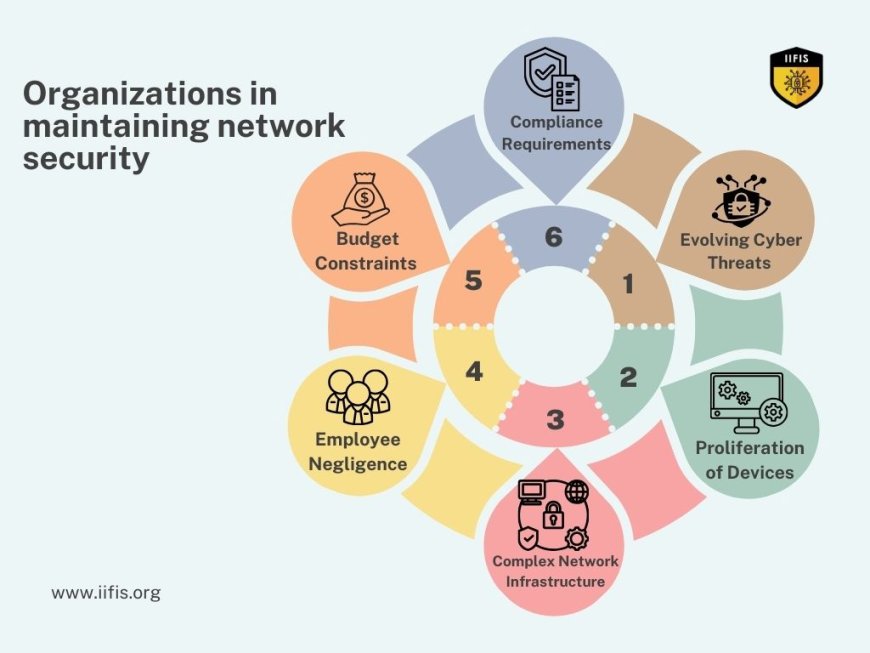Importance of Network Security Certification
Enhance your career prospects with a network security certification. Gain expertise in safeguarding networks against cyber threats. Boost your credibility and marketability.

The demand for network security is greater than ever in the connected world of the present internet. The importance of having to protect our information grows as we move around online environments with comfort, exchanging data, making purchases, and meeting people.
People and organizations are realizing how important network security is to keeping private information given the development of dangers including malware, phishing scams, and data attacks. Underdeveloped network safety precautions may present an important danger to confidential data, involving personal information and private company documents.
Network security is becoming increasingly important. It is critical to protect private information since dangers such as software and data hacks are becoming more common. As we work to reduce risks, terms like cybersecurity and data protection are becoming more important. Our method of security must change along with technology to keep up with new dangers and stay one step ahead of unscrupulous people. Network security must be given the highest importance to have a safe digital society.
Discuss the challenges faced by organizations in maintaining network security.
1 Evolving Cyber Threats: Cybercriminals are always coming up with new methods, such as infections, fake emails, and zero-day weaknesses. Advanced Persistent Threats (APTs) compromise critical data by targeting businesses and going unknown for a certain amount. Social engineering is the use of psychological tricks to coerce someone into disclosing private information or breaking security rules.
2 Proliferation of Devices: Since IoT development has improved network management, it has also created new opportunities for cyberattacks. Allowing you to bring your device increases attack surfaces and puts security measures to the test. Shadow IT poses dangers because workers break organizational rules by using unapproved software or devices.
3 Complex Network Infrastructure: Specialized security solutions are necessary for large companies due to their diverse network topologies. It is difficult to manage security across branches and remote sites, and networks are exposed to risks due to out-of-date software.
4 Employee Negligence: Hacking methods take advantage of employees, exposing data and risking network security. Employees who use weak passwords or don't receive cybersecurity training are more open to being targeted by hackers.
5 Budget Constraints: Strong security efforts may be limited by resource constraints, leaving networks open to cyberattacks. The success of security can be affected by cost-cutting initiatives. Careful planning and risk assessment are necessary for finding a balance between organizational objectives and security expenses.
6 Compliance Requirements: Maintaining compliance with rules like PCI DSS, HIPAA, and GDPR is crucial in managing data. Monitoring is important since non-compliance carries the danger of fines and damage to reputation. Different industry requirements make network security more difficult, requiring specific compliance plans.

Building a Strong Knowledge Foundation
- Early in my career, I felt overwhelmed by the complexities of securing networks. I had to get a solid grasp of essential concepts like firewalls, encryption, and intrusion detection.
- Certifications like CompTIA Security+ and Cisco CCNA Security gave me structured knowledge and practical understanding. Without them, I would have struggled to handle the real-world complexities of network defense.
Professional Recognition and Credibility
- Once I earned my certifications, I began to notice a significant difference in how employers and peers viewed my skills.
- Certifications such as Certified Information Systems Security Professional (CISSP) and Certified Ethical Hacker (CEH) gave me instant credibility, proving to employers that I had the expertise to secure networks and handle emerging cyber threats.
Career Advancement
- My network security certifications opened up a variety of career paths. Before my certifications, I worked as a network administrator, but after earning my CISSP and Certified Network Defense Architect (CNDA), I transitioned to roles like security consultant and network security architect.
- With certifications in hand, I found new opportunities, higher-level roles, and career progression that I wouldn’t have accessed otherwise.
Increased Earning Potential
- Having certifications directly contributed to my salary growth. After earning certifications like Certified Information Security Manager (CISM), I was able to negotiate for better compensation packages.
- Research shows that professionals with certifications often earn significantly more than their non-certified counterparts. For me, certifications not only opened better job opportunities but also boosted my earning potential.
Practical Hands-On Experience
- One thing I appreciated about certifications was the hands-on labs and practical exercises. For example, preparing for Certified Ethical Hacker (CEH) involved working with penetration testing tools and conducting simulated attacks, which gave me real-world experience.
- This kind of learning helped me gain the confidence to handle live network issues and put theory into practice.
Staying Ahead of Emerging Threats
- Cybersecurity is an ever-evolving field, and certifications ensure you're up-to-date with the latest trends and techniques.
- Preparing for certifications like Certified Cybersecurity Analyst (CySA+) helped me stay on top of emerging threats such as ransomware, APTs, and zero-day vulnerabilities. The constant learning keeps you prepared for new challenges as they arise.
Networking Opportunities
- One of the best things about certifications is the opportunity to connect with other professionals in the field.
- Through online forums, conferences, and certification bodies like ISACA or ISC2, I built a network of cybersecurity professionals. These connections provided valuable insights and career growth opportunities, further solidifying the importance of certifications.
Advantages for Organizations Network Security Certification
Network security certification offers many benefits to businesses. IT professionals with certifications have better knowledge of identifying and blocking online threats, improving cybersecurity in general. Businesses can gain stakeholders' trust by investing in certification since it shows credibility and a commitment to securing private information. It makes it easier to stick with industry standards, which verifies that legal obligations are met and reduces risks. Also, accredited teams provide a competitive advantage by showing their superior cybersecurity skills and drawing in business and talent. Professionals can keep up with new dangers and technology by getting certificates that facilitate ongoing learning and development. For enterprises, network security certification becomes a strategic investment that strengthens defenses, reduces risks, and enhances reputation in an increasingly digital environment.
Skills and Knowledge Network security certification
-
Network security certification provides knowledge in cryptography, intrusion detection, and network structure.
-
Students get knowledge on how to identify weaknesses and put in place strong security measures.
-
Certifications cover a range of security technologies and optimal methods.
-
Implementing security protocols, threat analysis, and tracking networks belong to the skills.
-
It is common to use practical experience, which makes it possible to apply theoretical information.
-
In general, certification allows workers to defend data integrity and businesses from cyberattacks.
A certification in network security is a must in the modern digital world. It improves job prospects, confirms expertise, and verifies compliance to industry norms. Professionals with certifications foster an environment of lifelong learning and adeptly adjust to changing online dangers. Their standing among clients and employers improves organizational security postures. By keeping abreast of cybersecurity developments, they reduce risks and protect important assets. Network security certification is vital for protecting digital infrastructures and promoting a safe online environment in a world where cyber threats are present.






















